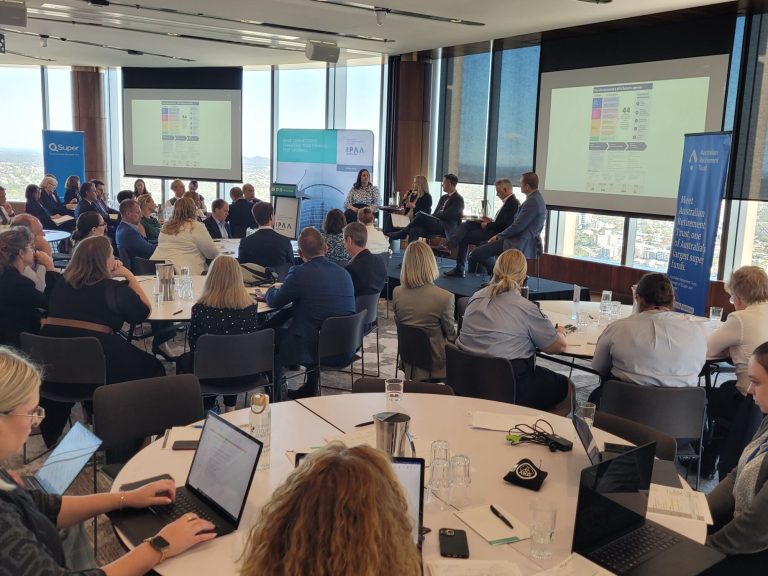Stewardship and the future of the public sector

Image credit: IPAA Queensland
Is stewardship just another term for leadership or does it bring a new perspective to public service? IPAA Queensland tackled this question at the inaugural Public Sector CEO forum, challenging 50 CEOs and senior leaders across the Queensland public sector about stewardship and leadership.
Delivered in partnership with the Queensland Public Sector Commission and QSuper (part of Australian Retirement Trust), the forum challenged commonly held ideas about what it means to steward the sector and invited senior leaders to consider the longevity of the impact of public service on the community.
The stellar panel included leaders from a diverse range of industries across Australia, including:
- Dr Rachel Bacon, Deputy Secretary, Public Sector Reform, Department of the Prime Minister and Cabinet
- Professor Nick Barter, Professor of Strategy and Sustainability, Griffith University
- Stevhan Davidson, Chief Strategy Officer, Australian Retirement Trust
- Chris McLaren, Queensland Government Chief Customer and Digital Officer.
Moderated by Jessica Oostenbroek, Senior Director, First Nations Health Workforce, Queensland Health, powerful discussions were held around what it means to drive positive change and a legacy perspective.
What is stewardship?
All panelists expressed a shared belief that stewardship is deeply grounded in legacy, the goal of creating a better future through today’s leadership. Professor Nick Barter drew on the field of sustainability which has developed the concept over a number of decades, defining it as meeting the needs of the present, without compromising those of future generations. While Chris McLaren highlighted the tangibility of stewardship, saying that it can be measured by the extent that we leave the world in a better condition.
These key messages speak to something more than leadership alone. Stewardship is not just leading for the needs of today, but calls on evidence, strategies and practices that will meet the needs of the future as well as new levels of courage and conviction.
Key takeaway: Stewardship is distinct in its focus on meaningful legacy and long-term betterment for the community.
What does this mean for public service?
Dr Rachel Bacon implored people to consider the importance of public trust to modern public service. She said that 90% of APS public servants recently surveyed saw themselves as stewards, and that one way to thinking about stewardship is through how public servants build trust through their interactions with customers. This resonated too with our panelist from Australian Retirement Trust, Stevhan Davidson, who said that they had identified stewardship as an important capability in their organisation and that they saw trust as a galvanizing factor for embodying a service-orientated culture.
Similarly, Dr Bacon talked about the importance of empathy to building trust and integrity in the public perception, and Chris McLaren found a parallel to this in the need for senior leaders to model what “customer centric” looks like through their behaviours and mindsets.
Key takeaway: Integrity and public trust remain key factors and can be developed through empathy for those whose lives we impact.
How do we develop ‘stewardship’?
IPAA Queensland’s recent ‘Stewards on the Couch’ with Public Sector Commissioner David Mackie, highlighted the power of purpose for forging a meaningful career and effective leadership in public service. This key driver came through again through the discussion on stewardship.
Reflecting on his private sector background, Chris McLaren asked – ‘How do you motivate people in the public sector to go above and beyond without hard incentives?’ One strong contender from the panel was purpose. Dr Rachel Bacon said that to “stand in the shoes of those whose lives we impact” is key. Excellence in the public sector is driven by a shared and strong sense of purpose – the desire to be part of the solution for a better services and outcomes.
Both Dr Rachel Bacon and Professor Nick Barter suggested that there was much to learn from First Nation’s custodianship approaches.
Finally, Professor Barter rounded out the discussion by suggesting that stewardship has a 30-year horizon. As a capability, stewardship therefore requires strong leadership competencies and attributes, such as courage, integrity, inclusivity, political acumen, and accountability. But it also requires a mindset that is orientated towards the long-term impacts of today’s actions, systems thinking, and skills in navigating multiple forms of evidence.
Key takeaway: Purpose in public service is an important lever for developing stewardship capability.
The Queensland Public Sector Commission is developing a 5-year strategy for an even better public sector for Queensland as part of the government’s response to the recommendations of the Coaldrake Review of the sector. IPAA Queensland was proud to support this through establishing the Public Sector CEO Forum.
